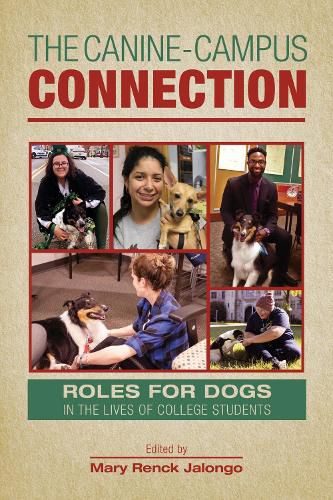Readings Newsletter
Become a Readings Member to make your shopping experience even easier.
Sign in or sign up for free!
You’re not far away from qualifying for FREE standard shipping within Australia
You’ve qualified for FREE standard shipping within Australia
The cart is loading…






A primary mission of universities is promoting student success and well-being. Many college and university personnel have implemented initiatives that offer students the documented benefits of positive human-animal interaction (HAI). Accumulating evidence suggests that assistance dogs, therapy dogs, and shelter dogs can support student wellness and learning. The best programs balance the welfare of humans and canines while assessing students’ needs and complying with all laws and regulations. Contributors to this edited volume have drawn upon research across many disciplines as well as their extensive practical experiences to produce a timely and valuable resource - for administrators and students. Whether readers are just getting started or striving to improve well-established programs, The Canine-Campus Connection provides authoritative, evidence-based guidance on bringing college students and canines together in reciprocally beneficial ways.
Part one examines the interactions between postsecondary students and canines by reviewing the literature on the human-canine bond. It establishes what necessarily must be the top priority in canine-assisted activities and therapy: the health and safety of both. Part two highlights four major categories of dogs that students are likely to interact with on and off campus: service dogs, emotional support animals (ESAs), therapy dogs, and homeless dogs. Part three emphasizes ways in which dogs can influence student learning during classes and across aspects of their professional development. Part four considers future directions. Authors take the stance that enriching and enlarging interactions between college students and canines will require university personnel who plan and evaluate events, projects, and programs. The book concludes with the recommendation that colleges and universities move toward more dog-friendly campus cultures.
$9.00 standard shipping within Australia
FREE standard shipping within Australia for orders over $100.00
Express & International shipping calculated at checkout
A primary mission of universities is promoting student success and well-being. Many college and university personnel have implemented initiatives that offer students the documented benefits of positive human-animal interaction (HAI). Accumulating evidence suggests that assistance dogs, therapy dogs, and shelter dogs can support student wellness and learning. The best programs balance the welfare of humans and canines while assessing students’ needs and complying with all laws and regulations. Contributors to this edited volume have drawn upon research across many disciplines as well as their extensive practical experiences to produce a timely and valuable resource - for administrators and students. Whether readers are just getting started or striving to improve well-established programs, The Canine-Campus Connection provides authoritative, evidence-based guidance on bringing college students and canines together in reciprocally beneficial ways.
Part one examines the interactions between postsecondary students and canines by reviewing the literature on the human-canine bond. It establishes what necessarily must be the top priority in canine-assisted activities and therapy: the health and safety of both. Part two highlights four major categories of dogs that students are likely to interact with on and off campus: service dogs, emotional support animals (ESAs), therapy dogs, and homeless dogs. Part three emphasizes ways in which dogs can influence student learning during classes and across aspects of their professional development. Part four considers future directions. Authors take the stance that enriching and enlarging interactions between college students and canines will require university personnel who plan and evaluate events, projects, and programs. The book concludes with the recommendation that colleges and universities move toward more dog-friendly campus cultures.